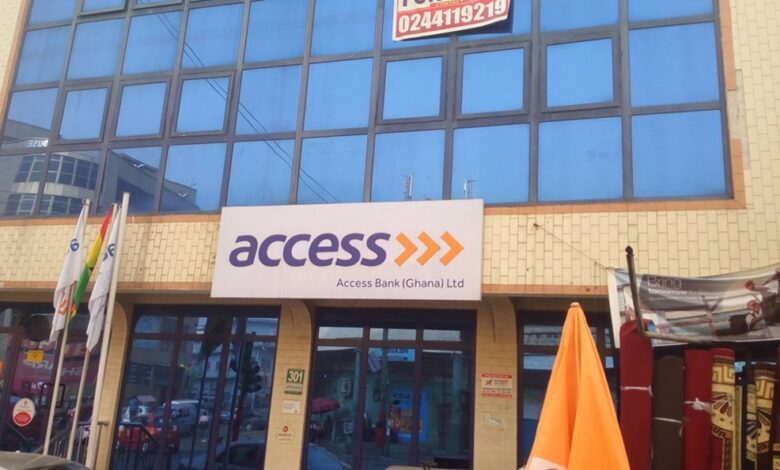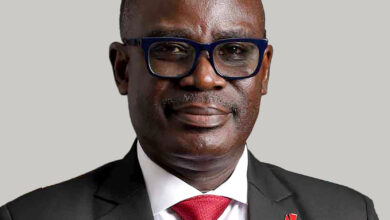Access Bank leads in eco-friendly financing

By Olumide OLATUNJI
IN today’s world, sustainability has become a key focus for banks. This is driven by the growing recognition that financial institutions play a critical role in addressing global environmental and social challenges.
Banks are increasingly prioritising sustainable practices, not only to meet regulatory demands and stakeholder expectations but also to manage risks and seize opportunities associated with the transition to a greener economy.
By integrating sustainability into banking operations, investment decisions, and lending practices, banks are positioning themselves as responsible corporate citizens, contributing to a more sustainable future while enhancing long-term value for their customers and shareholders.
In alignment with the Bank of Ghana’s Environmental, Social, and Governance (ESG) guidelines, which require banks to integrate ESG considerations into their operations, financial institutions like Access Bank is leading the way in incorporating ethical, social, and environmental dimensions in doing business.
Leading by Example
For many businesses, sustainability has only recently emerged as a priority. This shift is partly due to the fact that corporate responsibility has not always been a significant concern for customers, employees, or management.
However, at Access Bank, the process of building a sustainable future for Ghana and other regions commenced in 2008 when the bank’s Corporate Social Responsibility division was established.
Since then, we have persisted in creating key initiatives that have effectively addressed the main social, environmental, and economic issues facing the communities and countries where we operate.
At Access Bank, our sustainability journey has led us to reform our business operations and continuously develop new strategies that aim to create a brighter future for our customers and the world.
It has not been an easy journey; however, our dedication remains unwavering because it is the only way to achieve long-term prosperity.
Access Bank (Ghana) Plc has implemented various initiatives focused on financial inclusion, digital transformation, and environmental sustainability among others.
Our strategy at Access Bank is built on three pillars: Sustainable Operations which aims to minimize environmental impact and optimizing resources to support economic, social environmental goals, Corporate Social Investment (CSI) to support community-focused initiatives in education, health and economic empowerment, and Sustainable Development Finance which focuses on funding projects that promotes long term economic growth.
One of the keyways in which financial institutions can contribute to sustainable development is through sustainable lending practices. By providing financing for projects and initiatives that align with the Sustainable Development Goals (SDGs), banks can help to drive progress towards a more sustainable future.
With Access Bank’s strategy to finance the future, we provide innovative and sustainable financing solutions supporting businesses and individuals. We offer sustainable lending investments, partner development finance institutions (DFIs) and donor agencies, to raise funding for micro, small, and medium-sized enterprises (MSMEs).
We operate in one of the most challenging markets in the world, with multiple developmental issues. Considering that challenges create opportunities; we are devoting our resources to achieving results and making an impact through the power of finance.

As a result, we promote access to banking alongside social inclusion while contributing to the development of the communities where we are present and preserving the environment.
Another important way in which financial institutions can contribute to sustainable development is through their operations. As businesses expand, their resource consumption often grows as well.
This can have a hugely damaging effect on the environment through an organization’s carbon emissions. Environmental protection, therefore, should feature heavily in any company’s sustainability program.
Access Bank’s Go Green strategy aims to create sustainable projects in clean technology, waste-to-wealth, greening Africa, emissions reduction, and client go-green support, contributing to the achievement of SDGs.
Access Bank Ghana has also collaborated with several organizations to support these sustainable initiatives. We have implemented various sustainability initiatives, including recycling programs like ‘Waste is Useful’ and energy-efficient solutions such as solar-powered ATMs, reflecting our dedication to minimizing our carbon footprint.
These exemplify SDG 12, promoting responsible consumption, while our “Waste to Wealth” initiatives align with SDG 4 by fostering quality education and ensuring that no child is left behind and SDG 8, creating jobs and empowering local shoemakers in the Ashanti Region.
Collectively, these initiatives have helped reduce the bank’s carbon emissions by over 18,359t. Our CSI initiatives in 2024 have impacted over 358,632 individuals through education, entrepreneurship, health, and environmental efforts, demonstrating our commitment to sustainability.
Banks must recognize that their growth and success are inextricably linked to the health of the planet. That’s why at Access Bank we are committed to embedding sustainability into every aspect of our operations, from reducing our carbon footprint to supporting green initiatives that benefit our operational communities. Our goal is to create a future where financial prosperity and environmental stewardship go hand-in-hand, and we are proud to be leading the way in Ghana’s banking sector.
Employee satisfaction is a priority at Access Bank, which is why we emphasize employee safety and well-being through wellness programs and work-life balance initiatives.
Under SDG 10, the bank employs persons living with disabilities while ensuring equal opportunities for all employees. Accessibility is also a key focus; the bank has wheelchair-accessible buildings, inclusive banking services, and disability-friendly communication channels in place.
Through these initiatives, we aim to create a supportive and inclusive environment that not only prioritizes employee satisfaction but also aligns with our broader goals of sustainability and social responsibility.
We believe that true sustainability is achieved when we empower connections that matter with our suppliers, employees, customers, and communities. By insisting on responsible practices, inclusive workplaces, and accessible services, we are building a future where everyone can thrive.
Our commitment to diversity, equity, and inclusion is unwavering, and we are proud to be a beacon of hope for a more sustainable and equitable world.
At Access Bank, we are not just banking on a sustainable future; we are building it. I am proud to say that our commitment to sustainable operations is transforming lives and livelihoods in the communities we serve.
This year, the bank grew its sustainability loan book by GHS456 million, contributing 15% of the bank’s entire loan book, the bank also raised over GHS480 million from Development Finance Institutions (DFI), impacting over 8,000 beneficiaries.
In 2019, our parent company issued the first Climate Bonds Initiative (CBI)-certified corporate green bond in Africa, raising US$41 million from the issuance of green bonds, which offer a purposeful investment opportunity for individuals and institutions seeking to support renewable energy projects.
Also, in 2022, we successfully closed our second green bond issuance, raising $50 million. The step-up puttable green bond was issued under the Access Bank $1.5 billion Global Medium-Term Note Programme and is listed on the main market of the London Stock Exchange.
By the end of 2024, we are aiming to take our impact to the next level by growing our sustainability loan book, empowering more MSMEs, and extending financial inclusion to thousands more individuals. This is not just about numbers but about creating a brighter future for Africa, and we are honored to be leading the way.
Collaboration and Partnerships
In the power of SDG 17, we have showcased the power of partnerships, united in our vision of a sustainable future for all. Achieving sustainability goals requires collaboration and partnerships across sectors.
Financial institutions can collaborate and form alliances with government agencies, non-profit organizations, and industry peers to amplify the impact of their sustainability efforts.
By working together towards common goals, we can leverage collective expertise and resources to address complex environmental and social challenges, drive innovation, and create shared value for all stakeholders.
Through strategic partnerships, we can also enhance industry reputation and make a meaningful difference.
Over the years, Access Bank has demonstrated SDG 17 by fostering sustainable economic growth by forming strategic partnerships with reputable organizations such as the Development Bank of Ghana (DBG) and the International Finance Corporation (IFC).
Other partners include UNFPA, Rana Motors, Horseman shoes, Ghana Education Service, and the Ghana Football Association, among others. These collaborations are not only integral to our mission of driving value creation within the economy, but they also play a crucial role in shaping a sustainable future.
By aligning with institutions that share our vision for innovation, financial inclusion, environmental responsibility, and sustainability, we ensure that businesses — both large and small — have the resources and support needed to thrive, adapt, and contribute to long-term economic prosperity.
At Access Bank, we understand that creating sustainable value is a collective effort. These partnerships enable us to offer tailored financial solutions, foster job creation, and enhance economic resilience across the communities we serve.
Together, we are laying the groundwork for a future where businesses flourish, and societies benefit from inclusive, responsible growth.
Alone, we can make a difference, but together we can change the world. Access Bank believes that collaboration is the catalyst for a sustainable future.
By forming strategic partnerships and alliances, we can pool our expertise, resources, and passion to tackle the complex challenges facing our planet and our communities.
Together, we can drive innovation, create shared value, and make a lasting impact that benefits all. Let us join forces to build a better world for generations to come.
Embracing Innovation
Innovation is key to driving sustainable change. Financial institutions should encourage a culture of innovation within the sector to develop creative solutions to tackle sustainability challenges.
This could involve investing in green technologies, digitalizing processes to reduce paper usage, launching sustainable financial products and services, or developing initiatives to empower women and youth in the community.
Looking ahead, Access Bank Ghana is committed to continuing to innovate and find new ways to make a positive impact. At Access Bank, we believe that by embracing a culture of creativity and experimentation, we can unlock new solutions to the complex challenges facing our world.
From green tech to digitalization, sustainable finance to community empowerment, we are committed to pushing the boundaries of what is possible. As we look to 2027 and beyond, we are excited to accelerate our impact, align our strategy with the SDGs, and prove that financial institutions can be a force for good in the world.
Conclusion
Sustainability is not just a niche concept but a responsibility that organizations must embrace to secure a better future for generations to come.
By integrating sustainability into the DNA of the financial sector, collaborating with stakeholders, and driving innovation, we can pave the way for a brighter, more sustainable tomorrow.
Together, let us champion sustainability and create a legacy of positive change for our planet and its people.
.




